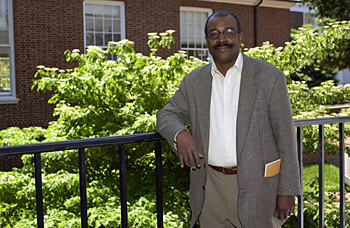
Smothers recalled his career began when he was in search of a summer job in his hometown of Washington, D.C., after graduating from Hobart College. He was applying for a job as copy boy at the Washington Post, but the person interviewing him suggested to Smothers that he apply for an internship instead.
When he discovered the internship paid $15 more a week, that clinched it, Smothers recalled, and that $15 was the incentive that began a long and distinguished career in journalism.
“I was an English major and liked to write,” Smothers said, “and although I wrote for my junior high, high school and college newspapers, I never really considered a career in journalism.”
The year was 1967, when there were riots in Newark, N.J., and Smothers soon found himself in the thick of it. “There were not many black reporters in those days, and the Post felt I could go places and talk to people that other reporters could not. So the Post bought me a plane ticket, and I became part of the team covering the event, which was big news.” He also helped with the post-riot articles run by the Post, again doing man-on-the-street interviews.
He joined the staff of Newsday on Long Island for one year and then was approached to become part of Community News Service, funded by the Ford Foundation, which was to cover black, Puerto Rican and other minority communities, not covered by the main media.
“We were a wire service without a wire,” he said. “We wrote our stories and sent them by motorcycle once a week to the major and lesser-known New York newspapers.
“I was the chief contact for the group and visited the newspapers and read them chapter and verse as to why they should use our stories concerning minority communities,” Smothers said.
After three years with Community News Service, he was invited to become a reporter on the metropolitan beat of The New York Times, and began his long, varied career of 35 years there.
When the Attica prison riots in upper New York State took place, Smothers was sent there because, again, as a black reporter, he could get the stories others couldn't. He also helped with the anniversary story a year later.
After covering city hall and the state house in Albany, Smothers left Manhattan for the suburban beat, and then became city hall bureau chief and an urban affairs reporter.
In 1984 Jesse Jackson became a serious candidate for president--not that he would win, Smothers pointed out, but he was considered influential and could affect the nomination process, and Smothers was assigned to cover his campaign. “Jesse Jackson traveled everywhere--Havana, Damascus, Tijuana, Mexico City and all over the country. I didn't go to Havana but I went everyplace else, covering Jackson.”
Political reporting meant being away from home for long periods of time, Smothers said. “I learned that lesson when I came home one day after being on the road, and my young son looked up and said, 'What are you doing here?' ”
Smothers' next assignment in 1988 was The New York Times' Atlanta bureau, which covered eight southern states, and in 1994 he became bureau chief. He returned to the New York area in 1997 and asked to cover New Jersey politics. A recent article of his in the Times reported on controversial plans to dredge the Delaware River.
In spite of his busy career as a journalist, Smothers is not a stranger to academia. While in Atlanta, he was invited by Harvard University's Joan Shorenstein Center for the Media to give a lecture on “How the Media Deals with Race.” The speech dealt with what the media has done and not done in terms of race and is a discussion of riots and minority communities, he said.
A year later, a friend who saw the speech persuaded him to expand and develop his remarks into a seminar course, “Race and the Media,” which he taught at Rutgers University. He also was an adjunct professor at Brooklyn College, teaching news writing.
Smothers said he is looking forward to his new position at UD as part of the English department and said he is excited about being involved in the start up of the new minor in journalism program.
Article by Sue Moncure
Photo by Tyler Jacobson


